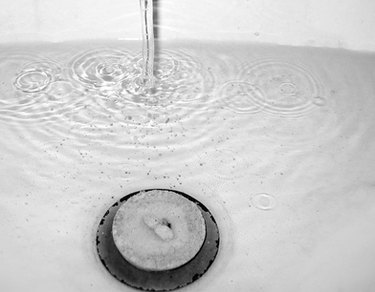Things You'll Need
Channel locks
Mechanical drain auger
Metal drum auger
Thick rubber gloves
Plastic J-hooks
Chemical drain cleaner

Every homeowner knows that plumbing pipes can become clogged. Proper cleaning of pipes is an important part of preventative maintenance that will help to reduce the possibility of a major blockage–which is a much more difficult and expensive problem to fix. Professional plumbers can clean your pipes, but if you don't mind getting dirty you can save yourself some money and do it yourself. All you need are a few products that can be found at most hardware or home improvement stores.
Mechanical drain cleaning
Step 1
Determine the location of the clog in your drain by observing which of your fixtures are backed up. If all fixtures in a bathroom are backed up, that means that the source of the clog is within the plumbing system for that particular bathroom. Similarly, if all fixtures in your home are backed up, the problem is within the main line; if one fixture is backed up, the clog is before the drain meets with the drains of other fixtures.
Video of the Day
Step 2
Purchase or rent a mechanical or manual drain auger, also known as drain snakes, from your local home improvement store, such as Lowe's or Home Depot. The main difference between mechanical and manual drain augers is that one is powered by an electric motor, while the other requires man power to rotate the auger.
Step 3
Remove the clean-out plugs or trap from the access point closest to the clog using a pair of channel locks.
Step 4
Hand feed the metal auger as far down the drain as possible. Turn the machine on if using a mechanical auger or begin to crank the knob on the back of the metal drum.
Step 5
Feed the auger farther down the drain with a slow feed. If you feel the auger begin to bind, pull back slightly to free it and attempt again.
Step 6
Continue to feed the auger down the drain; work the clog free by slowly pulling the auger back and feeding it back down the drain. Repeat until clog is completely free.
Step 7
Turn machine off or stop cranking the manual auger, then manually feed the auger line back into the drum housing.
Step 8
Run hot water down the drain opening into the pipe for about 10 minutes to ensure that the pipe is free of debris. If the water drains down the pipe, you are finished. If the water does not drain, then repeat the process until the pipe is open.
Chemical Drain Cleaning
Step 1
Put gloves on to protect your hands.
Step 2
Determine whether the location of the clog is within a single fixture, bathroom, or main line, by observing which drains are backed up with water.
Step 3
Remove the clean-out plugs or trap from the access point closest to the clog using a pair of channel locks. If the clog is near a sink or tub drain, omit this step because you will be able to pour the liquid directly into the sink basin or tub.
Step 4
Elevate the pipe using plastic J-hooks to ensure that the liquid flows down toward the drain and doesn't spill back out through its entry point. If the clog is near a sink or tub drain, omit this step because you will be able to pour the liquid directly into the sink basin or tub.
Step 5
Pour the chemical drain cleaner directly into the sink, tub, toilet, or access point of the pipe.
Step 6
Allow chemical drain cleaner to set according to the directions on the bottle. It can take 15 minutes to one hour for the liquid to flow through the drain.
Step 7
Test the drain cleaner's efficacy by running hot water in the sink or pipe for about 10 minutes. If the water goes down the drain, the clog is clear and you are finished. If the clog returns, repeat the process until water flows down the drain freely.
Tip
It may be helpful to have a second person to help you determine the location of the clog. For maximum results, begin cleaning as close to the clog as possible.
Warning
Read all safety instructions and follow carefully before using chemical drain cleaner. Do not allow it to come in direct contact with skin or eyes.
Video of the Day